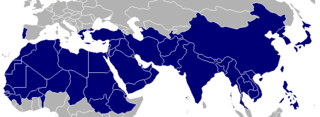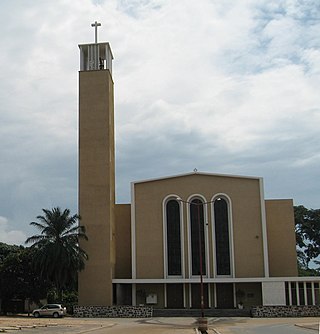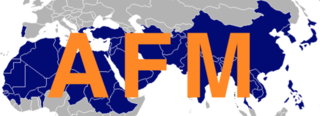
Evangelism or witnessing is the act of preaching the Christian gospel with the intention of sharing the message and teachings of Jesus Christ. It is sometimes associated with Christian missions.
This timeline of Christian missions chronicles the global expansion of Christianity through a listing of the most significant missionary outreach events.
A number of religious groups, particularly Christians and Muslims, are involved in the proselytization of Jews—attempts to recruit or "missionize" Jews.
A Christian mission is an organized effort to carry on evangelism or other activities, such as educational or hospital work, in the name of the Christian faith. Missions involve sending individuals and groups across boundaries, most commonly geographical boundaries. Sometimes individuals are sent and are called missionaries, and historically may have been based in mission stations. When groups are sent, they are often called mission teams and they undertake mission trips. There are a few different kinds of mission trips: short-term, long-term, relational and those that simply help people in need. Some people choose to dedicate their whole lives to mission.
The Lausanne Covenant is a July 1974 religious manifesto promoting active worldwide Christian evangelism. One of the most influential documents in modern evangelicalism, it was written at the First International Congress on World Evangelization in Lausanne, Switzerland, where it was adopted by 2,300 evangelicals in attendance.

The First International Congress on World Evangelization (ICOWE), also sometimes called the Lausanne Congress or Lausanne '74, was a Christian conference held from 16 to 25 July 1974 in Switzerland.

The 10/40 Window is a term coined by Christian missionary strategist and Partners International CEO Luis Bush in 1990 to refer to those regions of the eastern hemisphere, plus the European and African part of the western hemisphere, located between 10 and 40 degrees north of the equator, a general area that was purported to have the highest level of socioeconomic challenges and least access to the Christian message and Christian resources on the planet.

Christians in Bangladesh account for 0.30% of the nation's population as of 2022 census. Together with Judaism and Buddhism, they account for 1% of the population. Islam accounts for 91.04% of the country's religion, followed by Hinduism at 7.95% as per 2022 census.
Protestants in Myanmar make up 5% of that nation's population in 2023. Most Christians are from the minority ethnic groups such as Karen, Lisu, Kachin, Chin, and Lahu. An estimated 0.1% of the Bamar population is Christian.
The U.S. Center for World Mission, later known as the Venture Center, was a collaborative Christian mission base in Pasadena, California from 1976 until 2019. The center sought to connect other like-minded organizations around prayer, research, innovation, media, education, strategy, and mobilization with a continued focus on unreached people groups.
WEC International is an interdenominational mission agency of evangelical tradition which focuses on evangelism, discipleship and church planting, through music and the arts, serving addicts and vulnerable children, through Christian education, missionary and church leadership training, medical and development work, Bible translation, literacy and media production, in order to help local Christians share the gospel cross-culturally. WEC emphasises the importance of shared life in a local church as a vital expression of Christian life. WEC prioritises the planting of churches among indigenous people groups and unreached people groups, who have little or no access to the Christian gospel.

Ralph Dana Winter was an American missiologist and Presbyterian missionary who helped pioneer Theological Education by Extension, raised the debate about the role of the church and mission structures and became well known as the advocate for pioneer outreach among unreached people groups. He was the founder of the U.S. Center for World Mission, William Carey International University, and the International Society for Frontier Missiology.

Christianity is, according to the 2021 census, the fifth most practiced religion in Nepal, with 512,313 adherents or 1.8%, up from 2011 when there were 375,699 adherents or 1.4% of the population. Many informed observers have estimated that there are at least 1 million Nepali Christians. According to some Christian groups, there may be as many as 3 million Christians in Nepal, constituting up to 10% of the country's population. A report by Gordon Conwell Theological Seminary identified the Nepali church the fastest growing in the world. The vast majority of Nepali Christians are evangelical Protestants ; there is also a small Catholic population of roughly 10,000.

Evangelical Ministries to New Religions (EMNR) is a coalition of Christian countercult organizations. It was founded by Gordon Lewis, James Bjornstad, Ronald Enroth, and Walter Ralston Martin in 1982.
The Lausanne Committee for World Evangelization, more commonly known as the Lausanne Movement, is a global movement that mobilizes Christian leaders to collaborate for world evangelization. The movement's fourfold vision is to see 'the gospel for every person, disciple-making churches for every people and place, Christ-like leaders for every church and sector, and kingdom impact in every sphere of society'.
Christianity in the 20th century was characterized by an accelerating secularization of Western society, which had begun in the 19th century, and by the spread of Christianity to non-Western regions of the world.
Integral mission or holistic mission describes an understanding of Christian mission that embraces both evangelism and social responsibility. With origins in Latin American, integral mission has influenced a significant number of Protestants around the world through the Lausanne Movement.

Religion in Burundi is diverse, with Christianity being the dominant faith. Catholicism is the largest Christian denomination in the country.

Anglican Frontier Missions is an American-based Christian mission organization that "To plant biblically-based, indigenous churches where the church is not, among the 2 billion people and 6,000+ unreached people groups still waiting to hear the Gospel for the very first time."
In Christianity, an unreached people group refers to an ethnic group without an indigenous, self-propagating Christian church movement. Any ethnic or ethnolinguistic nation without enough Christians to evangelize the rest of the nation is an "unreached people group". It is a missiological term used by Evangelical Protestants. The Lausanne Committee for World Evangelization defines a people group as "the largest group within which the gospel can spread as a church planting movement without encountering barriers of understanding or acceptance." "Nation" is sometimes used interchangeably for "people group". The term is sometimes applied to ethnic groups in which less than 2% of the population is Evangelical Protestant Christian, Including nations where other forms of Christianity are prevalent such as Western Catholicism, Eastern Christianity or Lutheranism.









